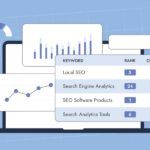
You probably saw it pop up at the top of a Google search. That shaded box with a full-blown answer to your question, written by AI. Maybe you felt a little bit of panic, wondering how is google ai overviews going to affect SEO and the traffic you’ve worked so hard to build.
You are not alone in this feeling. Many business owners and marketers are looking at these changes, worried about their organic traffic disappearing. So let’s talk about what’s really happening and how this new search experience will shape SEO strategy moving forward.
SEO Locale is now tracking Google AI overviews along with our standard keyword tracking as well for national and local SEO. Our team can help increase your visibility in the Google AI overview with our AI digital marketing services.
This is not just another update from Google’s AI. It’s a fundamental change in how people might get information. But it is not the end of search engine optimization; it is simply the next chapter you must prepare for.
What Exactly Are Google’s AI Overviews?
Think of AI Overviews as a super-smart concierge at the top of the search results page. Instead of giving you a list of links to check out, Google’s generative engine reads them for you. It then pulls together a summary to answer your question right there on the spot.
This feature, powered by Google’s Gemini model, is designed to make searching faster. The idea is to give you a direct answer without you needing to click on ten different blue links. This new AI mode completely changes the traditional search interface we have known for years.
Inside these AI-generated answers, you will still see links to the websites it used for information. But the big question everyone has is whether anyone will actually click them. That is the million-dollar question for business owners who depend on organic search for website traffic.
This changes the game from simply ranking high to being the source of truth for the AI itself. Providing accurate information through well-organized structured data will become more important. It signals a move towards what some are calling generative engine optimization.
The Big Question: A Traffic Apocalypse or Just a Shift?
Let’s address the elephant in the room. The biggest fear is a massive drop in website traffic, with some marketers worried about their organic traffic disappearing entirely. If Google answers the question for the user, why would they ever need to visit your site?
This could certainly increase the number of zero-click searches. We have seen this with featured snippets and knowledge panels for years, but this AI search feature is much more powerful. A low click-through rate can hurt a business’s bottom line if not addressed.
But it will not be a catastrophe for everyone. The impact will be very different depending on the search intent behind the search queries. It is less of an apocalypse and more of a strategic shift you will need to make in your digital marketing strategies.
Informational Queries: The Biggest Impact Zone
Your content that answers simple, factual questions is most at risk. Think about blog posts with titles like “What is inbound marketing?” or “How many ounces in a cup?”. The AI can answer these questions with ease, potentially lowering your click-through rates for these pages.
For these types of search terms, you will likely see a drop in clicks. The user gets their answer from the AI Overview and moves on. This means you must rethink the value of creating very basic, top-of-funnel content if your main goal is website traffic.
However, this content is still important for building topical authority, and good content creation remains vital. The AI still needs trusted sources to pull from, and a concept like query deserves freshness means updated, helpful content is still valuable. You just cannot depend on it for traffic the way you used to.
Commercial & Transactional Queries: A Different Story
Now, think about someone who wants to buy something. If they search for “best running shoes for flat feet,” an AI summary can be helpful. But they will still want to see pictures, read deep reviews, and compare prices.
People still need to click through to product pages to make a purchase, which should protect the conversion rate for these pages. They still want to read a detailed case study or a customer story before choosing a service. These are journeys that an AI summary cannot fully replace, highlighting the importance of an excellent user experience to close the deal.
The same goes for local searches and local marketing. A query for “emergency plumber near me” might get an AI Overview listing a few options. But the user still has to click to call, get directions, or visit the plumber’s website, making a well-optimized Google Business Profile more critical than ever.
So, How Is Google AI Overviews Going to Affect SEO Strategy?
Your SEO strategies need to adapt. It is not about abandoning what works but about adding new layers to your approach. Focusing solely on ranking for a single keyword is now an outdated model.
You have to think bigger. You need to focus on becoming the most authoritative and helpful resource in your niche. Your goal is to be so good that the generative engine has to cite you as a source, a new form of artificial intelligence optimization.
E-E-A-T Becomes Your Best Friend
You have probably heard of E-E-A-T. It stands for Experience, Expertise, Authoritativeness, and Trustworthiness. For years, it has been a guideline, but now, it is the main rulebook for effective content marketing.
Google needs to trust your content before its AI presents it as fact. You have to prove you know what you are talking about. You can read more about it directly from Google’s own documentation on creating helpful content.
This means you need strong author bios showing real-world experience. It means getting your business mentioned on other reputable websites through strategic link building. It means having genuine customer reviews that build trust with both users and Google search engines.
Long-Tail Keywords and Complex Questions Are Gold
An AI is great at answering simple questions. But it struggles with nuance and complex problems. This is where your marketing strategy can shine.
Start focusing your content marketing strategy on answering multi-part questions. Go beyond the “what is” articles and create content that solves a customer’s entire problem. These are the kinds of queries that cannot be neatly packaged into a two-paragraph AI summary.
For example, instead of “how to save for retirement,” you could target “what is the best retirement savings plan for a self-employed person in their 40s with a low risk tolerance?”. See the difference? One is a simple question, while the other needs a real, human expert to answer properly.
Becoming a “Cited Source” is the New Rank #1
In many cases, the new goal will not be the number one blue link. The new goal will be to get your site featured and linked within the AI Overview. This is a massive win for brand awareness.
Even if you do not get the click, having your brand name appear as a source builds authority. Users start to see you as a trusted name in your industry. This can lead to them searching for your brand directly in the future, bypassing AI entirely.
To do this, you need to structure your content so the AI can easily understand it. Use clear headings that ask a question, then answer that question concisely right below it. Using lists, proper schema, and well-organized structured data helps the AI pull your information.
Don’t Forget About The Rest of the Funnel
This is a good time to diversify your marketing efforts. Do not let your website’s health depend completely on top-of-funnel informational blog posts. Your digital marketing work should support the entire customer journey.
Spend more time optimizing your product and service pages. Write detailed comparison guides that help people make a decision. A strong focus on mobile optimization is crucial, as many users are on their phones.
Create powerful case studies that show off your results. These are mid-funnel and bottom-funnel assets. People who view this content are much closer to becoming a customer, and a good user experience on these pages is vital to improve UX and conversions.
Consider how paid search and paid social can complement your organic efforts. Tools for PPC tracking and various PPC keyword tools can help you manage these campaigns effectively. Analyzing ad impressions and click data gives you a more complete picture of your audience.
Practical Steps to Adapt Your SEO Today
Feeling overwhelmed? Do not be. Here are a few concrete steps you can take right now to prepare your marketing strategies.
- Conduct a Content Audit. Look at your existing content and use a website traffic checker to see which pages are most valuable. Identify the simple Q&A articles at high risk. You do not have to delete them, but think about how you can update them to add more depth, experience, and value that writing AI cannot replicate. It’s also a good time to identify traffic-stealing competitors and analyze what makes their content successful.
- Double Down on E-E-A-T Signals. Review your website. Are your author bios detailed? Are you showcasing your expertise? Start a plan to get more genuine customer reviews and mentions from other trusted sites in your field, like those recognized by Search Engine Land. Your Google Business Profile is a key part of this for local businesses.
- Refine Your Keyword Research. Go deeper than you have before. Look for conversational questions and long-tail keywords using advanced keyword tools. Your goal is to find the problems that your customers have that your competitors are not solving in-depth, targeting specific search intent.
- Structure Your Content for AI. When creating new content, make it easy for bots to read. Use clear headlines, short paragraphs, bullet points, and numbered lists. This not only helps the AI but also makes your content more readable for humans and improves core web vitals.
- Build Your Brand Beyond Google. A strong brand is your best defense against algorithm changes. Invest in your email list, your social media presence, and community-building. When people know and trust your brand, they will search for you directly, bypassing the AI Overviews altogether and preventing customer quiet quitting.
The Data So Far: What Do Early Studies Say?
It is important to remember that this is all very new. We are still learning how people will interact with AI Overviews in the long run. The data is just starting to trickle in from these recent Google algorithm updates.
But some early SEO predictions give us an idea of what to expect. For example, industry research firm Gartner made a bold prediction. They believe that search engine traffic will drop by 25 percent by 2026 because of AI chatbots and other virtual agents.
While that sounds scary, the impact will vary wildly based on query type. Here is a simple look at how different types of searches might be affected, which can inform your local SEO predictions and broader strategy.
| Query Type | Potential Impact | Reason |
|---|---|---|
| Simple Informational | High Negative | AI provides a direct answer, reducing clicks. |
| Complex Informational | Medium to Low | AI may summarize, but users need more detail. |
| Commercial Investigation | Low to Medium | Users want to compare products and reviews. |
| Transactional / Local | Low | Users need to click to buy or contact a business profile. |
This change puts more pressure on low-quality content. A thorough search guide might still do well, but simple definition pages will struggle. This creates a huge opportunity for high-quality, truly helpful content to stand out, rewarding businesses that invest in a solid content marketing plan.
Conclusion
This shift from Google is big; there is no denying it. But SEO has always been about adapting to change. This is just the next evolution, pushing us all to be better marketers and focus on artificial intelligence optimization.
It forces us to move away from chasing keywords and focus on what truly matters: helping our customers. Figuring out how is google ai overviews going to affect SEO is less about technical tricks and more about building a brand that people trust.
Start with hiring an SEO company like SEO Locale to help you take your business to the next level with our full digital marketing strategy.
Your expertise, your experience, and the real value you give are your best assets. In this new landscape powered by a generative engine, they are more important than they have ever been. This is your chance to lead with quality and build a stronger, more resilient business.












